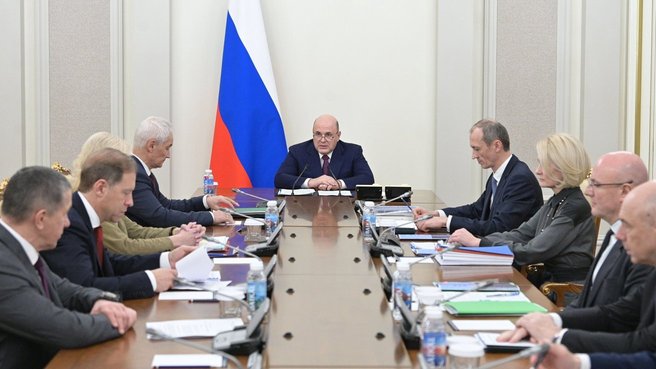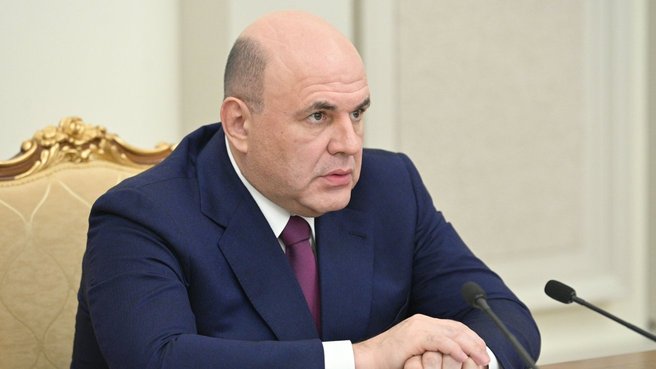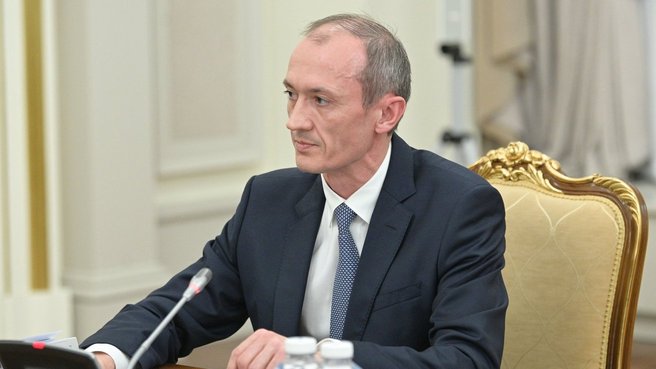The agenda: Co-financing the spending on medical worker salaries, digital platform for state environmental monitoring, the Concept for Improving Oversight Activities.
Mikhail Mishustin: Good morning, colleagues.
According to the President, public health is a national policy priority.
Much of this work has to do with ensuring timely co-financing of the salaries paid to newly employed doctors and nursing staff, including nurses, paramedics, ob-gyns, and pharmacists, in a word, everyone who is directly involved in caring for patients, helping them overcome illnesses. We will allocate over 7.5 billion roubles for this.
Preliminary estimates show that over 9,500 doctors and almost 17,000 nursing staff members will join the public health system in 2024. It is mandatory to make these resources available as quickly as possible so that these employees can receive their remuneration in full and, of course, on time. I would like to ask Ms Golikova and Mr Siluanov to keep this issue under their personal control.
The next issue concerns digital transformation in environmental protection and nature management.
Under the presidential instruction, the Government is busy completing the list of the most important and sought-after areas of technology that utilise AI capabilities in these areas. Federal public information systems covering the most important issues are being created. They are forming databases on the state of the environment using Eco-monitoring. Rosgidromet data will be stored and processed as well.
We are expanding our oversight over water and forest resources and, of course, over the subsoil. Waste management-related accounting is being improved as well. We are providing support for eco-tourism, including hikes in specially protected nature areas.
All these activities go hand-in-hand with the sustained transition to domestic software. We plan to complete the transition by 2030.
Two more projects will be added to the eight I mentioned earlier. There will be a digital platform for public environmental control. It will be available in every region and become a one-stop shop for addressing issues in this area.
The same capabilities are envisioned as part of the information system to preserve hunting resources. Once introduced, it will make it simpler for applicants to obtain the necessary documents. The order to this effect has been signed. We believe that further introduction of the latest technologies in environmental protection and nature management will, above all, improve the quality of life of our people.
Another issue concerns preparations for the next stage in reforming control and supervisory activities. This work has been underway for five years now, and during this time, as the President noted, the number of inspections has been reduced by five times, which is very important for creating a good atmosphere for businesses.
The Government has developed a Concept for Improving Oversight Activities for the next two years. A resolution, which also approved the plan for implementation, has been signed. Guidelines for developing the risk management system are being clarified. Measures are envisaged to adjust legislation and digitalisation in this area.
There is still a lot to be done to expand the application of pre-trial settlement mechanisms, including settlements in housing and utility disputes in residential buildings, and more actively involve management companies in these procedures in order to find a way to resolve conflicts as quickly as possible in the interests of our people.
Under the President’s instructions, the moratorium on inspections has already been extended through the next year, except, of course, for extremely high-risk facilities, as well as when special indicators are triggered. This exception is necessary to ensure the safety, health and well-being of people. In other cases, priority, of course, should be given to prevention rather than penalties. This mechanism is friendly for conscientious entrepreneurs. We will continue to further develop risk-based approach tools to prevent possible violations.
The situation with municipal control, including issues of land improvement or land regulation, also require special attention. Here too, uniform approaches should be established, if necessary, by amending the existing standards.
Mr Grigorenko, please elaborate on the other areas of oversight activity to be improved under the concept. You have the floor.
Dmitry Grigorenko: Mr Mishustin, colleagues.
Indeed, in accordance with the Presidential instruction, the Government is reforming oversight activities. The reform seeks to create a supportive business environment and to reduce the administrative burden on businesses.
In the last few years, the rules and regulations governing business activities have been drastically simplified, and in fact, these rules and regulations are the basis for inspections. As you said, the number of inspections has decreased by almost 80 percent over the past several years.
Approving the Concept for Improving Oversight Activities is a logical follow-up to the reform. I will name some of the provisions of this concept.
First, the completion of the transition to a risk-oriented approach when doing inspections, meaning that an inspection is due only if a control body has information about a potential violation. In essence, an inspection becomes a tool for preventing violations, rather than a punishment.
The goal is to eliminate inspections for the sake of inspections, as well as the situations where inspectors come to a site and then start looking for violations to justify the inspection.
Digitalisation comes second. The goal is to use digitalisation to minimise the amount of information that inspectors need to request during inspections. For this purpose, we integrate all information resources possessed by the oversight bodies in order to exchange information and eliminate overlapping information.
Third is simplifying the inspection procedures themselves, which includes digitalisation. In particular, this is a mechanism for remote inspections, which seriously simplifies the inspection and makes it transparent, more convenient and comfortable.
Fourth, prevention, as you said, and increasing the number of preventive visits. Generally speaking, this is a kind of free consultation for businesses. When the Government sees that a violation is possible, even before it is committed, it comes with a preventive visit to explain how certain standards and rules should be complied with.
And the last important thing. As instructed by the President, we are very particular about feedback which includes filing pre-trial appeals, when every entity under inspection can submit a petition – and not necessarily a complaint – in a simple and accessible form. Accordingly, any petition becomes a kind of assignment for us, a problem statement, which we may address in order to improve our rules, regulations and procedures.
Essentially, the idea behind the concept is that the inspection ceases to be a tool for penalty, but becomes a tool for creating an environment conducive to doing business without violating the applicable law.
Mikhail Mishustin: Thank you very much. You mentioned the pre-trial appeal procedure. This is important. I would also add that it is also important to keep in mind the feedback mechanism provided by the state services website. This way, they – our entrepreneurs and everyone else affected by these reforms – can not only submit a complaint or propose amending the procedure, but they can also obtain a consultation. A basic communication system is important in this regard. This includes new forms which will be used to conduct inspections or preventive visits starting next year. Without a doubt, it is important to monitor the concept that we have adopted to ensure that all the provisions that we have agreed on are effectively acted on.















